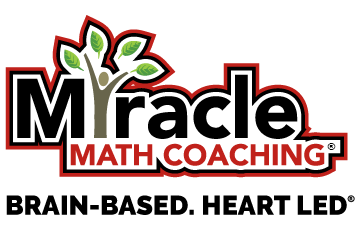6 Things You Can Do To Help Your Junior High Math Student
An Ultimate Guide to Teens and Algebra
Do you remember how excited your little girl was the first day she came home from school? Chances are she hopped off the bus or walked out the door with you chatting all about her day. She had the best lunch and made a new friend and she just loves Mrs.Johnson. Recess was awesome. In the following weeks she came from school and happily pulled out a few bent up pieces of paper with oversized-font math problems and smiled when she saw your eyes light up at the first sign of a smiley face sticker.
Fast forward to junior high. By now you have already dealt with the “new” math. You have tried to help your child off and on for years now only to hear “MOM that is not how we do it. DAD we DON’T do it like you guys did back in the old days.” And now your student is an 8th grader who landed in an algebra course.
You didn’t know the doors in your house could slam so loudly until you ended up with a young teenager on your hands. Every day you compete with a world of social media, hormonal teens, too many negative messages, in hopes of keeping your child healthy and on track. It’s exhausting. And now your child is struggling with algebra during one of the hardest years of their childhoods. So let’s take a look at what can be done from a bit of a holistic approach in helping your teens successfully make it through these years and their math courses. For starters, back to basics.
Basic Health for Your Teen
Young teens are in a difficult place. Their bodies are growing and changing and at the same time they lack the emotional maturity of older teenagers and young adults. They are also becoming increasingly independent. As parents, especially busy working parents, it is easy to start relying on kids at this age to be more self sufficient and to take on more responsibility. This is a good thing, but at the same time they are still children and when left to their own devices, will often stay up too late, skip meals, and form bad habits.
Here are a few statistics related to teen health that parents need to pay attention to:
- “More than 90% of American high school students are chronically sleep deprived” – Mozes
- In 2012, more than 30% of children and adolescents in the U.S. were overweight or obese. – CDC
- A World Health Report found that depression is the number one cause of illness and disability among adolescents between 10 and 19 years old, with suicide being the 3rd highest cause of death among adolescents in 2012.
- 15.8 million children under 18 in America live in households without consistent access to nutritional food
Teens need sleep. How much sleep should my teenager get? According to the National Heart, Lung and Blood Institute, teens should get 9 to 10 hours sleep a night. Lack of sleep can lead to irritability, difficulty concentrating, memory loss, decreased problem solving skills and contribute to depression and anxiety. Not an ideal situation for being successful in school and having focus when working on math problems.
For more information or help in working with your teen to achieve better sleep habits check these out…
Too Much Homework, Too Little Sleep: Structural Sleep Deprivation in Teens
7 Ways Parents Can Help Their Teens Get Enough Sleep
Teen nutrition. What should my teen be eating each day? Most teens are not taking in enough of the right foods on a regular basis. Nutrition is as important to brain development in teens as it is in toddlers. And it is essential for everyone to maintain a good level of energy and mental sharpness. Sometimes parents who are living on low calorie diets forget their kids have different caloric needs. And student athletes need even more because they can burn thousands of calories at practices and sporting events throughout the week. While government guidelines suggest that most need a total of between 2 and 6 cups of vegetables and fruits a day, there are many fitness coaches that would argue kids need closer to 4 cups of veggies and 4 cups of fruit per day. But most fall well below the government guidelines. Many parents go on a virtually fat or carb free diet. Fat and carbs are essential to brain development in children.

Check out these great resources for uncovering your teen’s nutritional needs…
Food & Fitness (great list of resources)
Taking care of teen emotional and mental health. How do you take care of your teens mental health? This is a very common concern. Let’s face it when teens are having trouble at school with friends, bullying, dealing with new relationship issues, it’s hard to get your child to focus on school work. So taking care of emotional and mental health is really important in helping your teen to focus. Today’s parent can relate to their teens’ experiences in some ways. But it is important to realize that they are living in a different time with different pressures. This may call for a different level of attention to the issues than what you experienced yourself as a teen. Be patient. Be loving. Be proactive.
The following resources can help you identify mental health issues beyond normal teenage moodiness and there are some good tips here for maintaining good teen mental health.
Parent’s Guide to Teen Depression
Back to School – Mental Health America
When it comes to overall physical and mental health, It’s easy for teens and adults to get off track. But getting back into a healthy routine and environment in your home may take a little time. Replacing bad habits with good habits should be a family effort. Make it fun, keep it positive and your teen will be better prepared for learning.
 Pay Attention to What Attitudes and Values You Reinforce
Pay Attention to What Attitudes and Values You Reinforce
Let’s get back to our 8th grade algebra student.
She has always been an overachiever. And now she is having a hard time with a school subject for the first time in her life. Remember younger teens most often lack certain coping skills. So this can make a student angry. And teens are often really, really good at placing blame on someone else for their problems. You have always watched your student succeed in math, so you may be quick to jump on board.
- Don’t support the “well I’ve always been a great student so I guess math just isn’t my thing.” As soon as you agree or say that was your story, you have given your child permission to not expect to do well.
- Do communicate openly with your teen. Express understanding that you know it is more frustrating for her because things have come somewhat easier to her in the past. Encourage her to see it as a challenge and offer help.
- Don’t automatically assume that your teen insisting that “this teacher just can’t teach” is true. Again, as soon as you join in trash talking this teacher because your teen is having a hard time, you are adding to the negativity in this situation.
- Do encourage your student to talk with the teacher about the issues she is having. Offer to set up a meeting, let your child know that you take her concerns seriously, but reinforce the idea that this teacher became a teacher for a reason and that it isn’t fair to form these opinions about a person without taking the opportunity to discuss the situation. Even if you suspect that your teen has valid complaints, it is important to not approach the issue with an us versus them mentality. Try the team approach first.
He has struggled to maintain average grades off an on throughout his school years. And now he is even more challenged by a more difficult level of math than before. His confidence has been broken before. The overachiever in his class has made fun of him before and made him feel like he’s “dumb.” He doesn’t talk much in class because he is afraid to ask questions. Three weeks in to the class he wants moved back to a lower math class.
- Don’t invalidate his feelings about his fears by telling him he is being silly or irrational. When you do this you are effectively slamming the door to open communication.
- Do offer to contact the teacher privately to find out what you all can do to help out and improve the situation.
- Don’t reinforce the idea that the best answer is moving out of the course.
- Do tell him that seeing him work hard for something is more important to you than having an A or B at the end of the course. Everyone should read this short blog post.
- Do consider working with a tutor. Teens with academic confidence issues benefit greatly from focused one on one instruction.
What do you value? Do you spend more hours in your house listening to your teens gossip about who’s doing what than you do talking about things such as their personal goals, focusing on positive things in his or her day, or about their schoolwork? Of course your teens need to vent and discuss what is going on in their social lives because at this age it is the center of their real worlds. But fight for balance. The more you can help teens refocus on tangible things, achievable goal meeting, the more confident and stronger they become.
How to Respond to “Why do I have to learn algebra I will never use it!”
 This is such a common phrase to hear, not only out of teen mouths but adults as well. If we have retirees out in the world spouting off about the irrelevance of the higher math courses for most Americans than how do we change that viewpoint with junior high kids who are jealous because their friends in regular 8th grade math have it easy in their view? Sometimes even teachers themselves only answer “because you need to know this for the test” because they have a hard time expressing the importance to students.
This is such a common phrase to hear, not only out of teen mouths but adults as well. If we have retirees out in the world spouting off about the irrelevance of the higher math courses for most Americans than how do we change that viewpoint with junior high kids who are jealous because their friends in regular 8th grade math have it easy in their view? Sometimes even teachers themselves only answer “because you need to know this for the test” because they have a hard time expressing the importance to students.
The single biggest frustration for young teens in learning algebra is that they need to know why. They need to know why you are supposed to do a function a certain way. They want to know why they need to learn algebra.
When teachers are challenged with trying to cram everything that is basic algebra into one school year, it is often difficult for them to take the time to make sure all of their students get that. What if you are an adult who believes that algebra is important, but because you never caught on to it, you can’t figure out how to express the importance of it to your kids?
Here are a few tips:
- We are talking young teens here so go straight for the money talk. Teens love to shop. Explain to them that algebra is standing in front of a clothing rack and trying to figure out how much the 30$ shirt will cost when it is 20% off. Or how many video games they can buy with the 60% of their 150$ they racked up for mowing lawns that they are allowed to spend after putting the required 40% in savings.
- Next, talk food. Explain to teens that they want to make a batch of homemade chocolate chip cookies and they have a recipe that calls for two cups of sugar, but they only have 1.5 cups of sugar in the cabinet, that they can use algebra to calculate a new recipe and still make their cookies.
- Emphasize the intrinsic value of learning. This means we learn new things to better ourselves, to develop a deeper understanding of the world around us, to value the process of learning. This is important in a climate based on a lot of extrinsic (outside-reward based) values placed on education—i.e. test scores, college placement, scholarships, staying in the honor society, getting a good job. All of these things are important, but focusing only on extrinsic motivation deprives your child of an authentic learning experience and they will get frustrated quickly.
- Explain to your teen that algebra is a bit of a gateway course. And that in order to better understand higher level algebra, trig and calculus they will need to develop a good working knowledge of algebra. Emphasize that taking chemistry classes involves using algebra functions, and that in physics, an understanding of trig is important and that you cannot get trig without algebra.
- Do you have a teen who plans to go on to a vocational school later in high school? Understanding algebra is essential for having confidence in learning how to work in these technical training fields: nursing, engineering, information systems, architectural drafting, etc. Ask your student who thinks he wants to be a nurse someday, would you want a nurse giving you medicine who doesn’t know how to calculate dosages properly?
For your humanities driven students, those who gravitate towards English, philosophy, the arts or social sciences there is help for you too…
- Did you know that advanced studies in English involve the study of rhetoric? And rhetoric (what most commonly define as the art of persuasion) is rooted in the work of ancient philosophers like Socrates, Plato, the Sophists and Aristotle (who also happened to be a brilliant mathematician). Hang with me here…whether your student just loves English and philosophy, has visions of becoming a high school English teacher or a college instructor, a lawyer, a writer, a modern philosopher, etc. persuasive skills are key. And these argumentative skills involve different appeals to audience. Logical thinking is as much a part of success in these areas as it is in algebra. And the mental work you do in algebra will make you better at it.
- When it comes to the arts the world of art is changing. There are so many opportunities in graphic arts and digital design. Having an understanding and the mental capacity to do the work that is algebra, will set your student up to better grasp computer concepts in the long run that are needed. Traditional artists working with classic media forms can benefit from increasing spatial intelligence, understanding how to use ratios to mix colors and mediums, etc. Artisans who work with textiles and fabrics often use algebra when calculating how much material they will need or planning out patterns.
- Those who have hopes of working in the social sciences, working in sociology or psychology, anthropology etc. will have to learn to compose empirical research. And while some may think if they want to be a drug counselor they won’t have to use data each day when working with clients directly, they will have to be able to demonstrate these skills while getting through the journey to earn that certification or degree. And if they want to instruct in these areas, or have visions of being published in journals, or working to make positive changes in the world we live in, being able to conduct statistically valid research is a huge part of this.
Know this…inevitably you are going to have people in your life that say they never use algebra in these jobs. You may be one yourself. I would argue that basic algebra functions are so commonplace in some functions of these jobs that people forget they are actually doing algebra. And while sometimes we can achieve the same results with arithmetic, it is important to understand that using algebra can make the process easier rather than more difficult.
For more reading on this topic check these out…
“Why do we need to learn this?” – Dr. Allen Mendler
Do we need algebra? Are you kidding me? – Science Blogs
Why is algebra so important? – Great Schools
Using Your Teen’s Love for Multimedia to Support Learning Math
 We all know teens spend too much time connected to media. So much so that it feels like their cellphones have become part of their anatomy. It’s tough being a parent in 2015. We like the convenience of being able to contact our busy teens anytime, anywhere. And it is hard to enforce good habits like setting cell phones aside, or monitoring web browsing on a pc when your teen actually needs those tools for homework now because so much of the curriculum is being handled digitally. And your teen will be the first to remind you of this when you suggest simply working at the table with a notebook, a pencil, a standard calculator and a text book. This may come in the form of “mom I don’t have a text book remember I have to do my work online.”
We all know teens spend too much time connected to media. So much so that it feels like their cellphones have become part of their anatomy. It’s tough being a parent in 2015. We like the convenience of being able to contact our busy teens anytime, anywhere. And it is hard to enforce good habits like setting cell phones aside, or monitoring web browsing on a pc when your teen actually needs those tools for homework now because so much of the curriculum is being handled digitally. And your teen will be the first to remind you of this when you suggest simply working at the table with a notebook, a pencil, a standard calculator and a text book. This may come in the form of “mom I don’t have a text book remember I have to do my work online.”
So what to do?
- If possible to have a pc in a central location where you or someone else can check in and make sure your teen is actually doing math homework rather than reading the latest instagram comments on his girlfriend’s account, do it.
- Set aside a homework time during the evening where your student has access to the pc or tablet but ask them to plug their phones in elsewhere in the house for a set period of time.
- Trade free phone/web time for math related media time.
- Stay up on where your child is in her algebra learning and write out a few problems (not a lot) for her to work out on paper, or print out from a free web resource (don’t worry they have many choices with solutions) and have her sit at a table with a pencil and do the work.
- Rather than have your teens sit down and seek out tutorials and extra algebra or math help on their own, find some good resources for them. This may help steer them toward apps and software that helps them learn rather than simply giving them solutions…
Apps to check out for algebra and other math learning needs
You can search Google Play and iTunes for availability for your own device or visit these links depending on your needs.
Dragon Box Algebra
“Voted world’s best serious game at the International Mobile Gaming Awards”
web info: www.dragonboxapp.com
The Fun Way to Learn Algebra
This mobile application available through Google Play has extremely high ratings. And it’s free.
Mobile Learning In Action: Our 101 Favorite Apps
What I like about this list is that the Math section is at the top and for each app listed the short write up provides a brief overview, links, platforms and pricing. So if you are either a dedicated android or apple product user you can check that out before going any further.
15 Free iPad Apps for Teaching Algebra at eLearning Industry is good resource with links to these free apps with brief descriptions about how they can be used.
Are you a Google+ user? Consider adding these to your circles…
+iGameMom for great leads to educational apps across the board. Note that the math apps suggested are all linked at this site too and that this list is most geared towards math needs prior to algebra. But while there explore the site for everything it has to offer. Loads of great stuff.
+Eugene Khutoryansky for updates, resources and links. Or you can just jump right into these awesome youtube video tutorials that focus on why algebra and mathematics are important and learning concepts through 3D animations.
Additional Web Resources
Khan Academy – Algebra links to the algebra start up page. Of course there are multiple resources for parents and students for all branches of mathematics.
7 Websites for Parents who Want to see A’s on Report Cards – Miracle Math Coaching
Science and Math Camps
 I had a friend in school who went to a biomedical institute summer program because she was interested in the life sciences. She came from a poor family but found out she could qualify for governor’s grant at that time. They did things like testing their own urine for glucose levels and worked on a real cadaver in a university forensics lab. Not exactly my cup of tea but hey she came back a new person, more confident and determined to go on to college.
I had a friend in school who went to a biomedical institute summer program because she was interested in the life sciences. She came from a poor family but found out she could qualify for governor’s grant at that time. They did things like testing their own urine for glucose levels and worked on a real cadaver in a university forensics lab. Not exactly my cup of tea but hey she came back a new person, more confident and determined to go on to college.
Sometimes the benefits of a summer camp experience far outweigh the actual academic development. Whether it is an all day camp where teens are dropped off and picked up or a residential camp teens have an opportunity to:
- meet new people
- develop social skills
- gain more independence
- work on problem solving skills
- have more opportunities for hands on learning
- experience a different neighborhood, town, state or region
The programs vary and there is something for everyone. Some programs will focus on getting students who struggle up to speed. Others are designed to give advanced students enrichment opportunities. You should consider different programs carefully and select something that is within your budget and meets your individual child’s needs. There is also financial assistance available for many of these programs for those who qualify.
If your teen is already expressing interest in going to a certain college or university be sure to Google “summer academic camps at (college name)” other helpful search terms are summer enrichment programs, programs for math help, camps for algebra, etc. and you can add the college of choice. If you live in California and your teen is determined to go to college in New York, you can knock out the travel expenses of a college visit and a summer camp in one transaction.
Remember there will also be summer and year round academic camps and enrichment programs available through National Parks, churches, various environmental interests, local human services and volunteer initiatives. So be sure to look into those as well.
Check out these resources to get started and know that this is just the tip of the iceberg…
Johns Hopkins Center for Talented Youth Summer Programs
Math, Science, and Technology Summer Programs: A sampling of programs in NYC
Summer Programs – Math and/or Computer Science
Summer Camp – Miracle Math Coaching
List of Summer Science Programs for K-12 (Berkeley Resource)
University of Washington Summer Youth Programs
STEM Academic Summer Camps Grades 3 – College
Remember, You May Feel Like The Enemy Right Now – Find Someone Else To Help
Keeping your junior high kids excited about learning can be a challenge. And sometimes even when you and your teen have an awesome relationship, when you can talk about anything, and even if you are a successful algebra teacher, your child simply cannot deal with you when it comes to homework help. Don’t be upset, and don’t blame yourself. It’s nothing personal. It is part of life. It is part of their identity development. They want to separate from you and stop getting all of their advice and answers from you even though they love you. This is where finding someone else to help with homework can be helpful. An older friend, a cousin, an uncle may have better luck.
Contact us today to find out more about how are proven techniques and strategies have helped so many students grow.
If you have resources, personal stories, expertise, or questions related to any of the topics in this post please comment and join this conversation. How do you use algebra in your everyday life? Have you used an android app that you love? Discovered an awesome game for your iPad that helped you learn algebra? Have you or your child went to a summer camp for a math and science program? Jump in.


 Pay Attention to What Attitudes and Values You Reinforce
Pay Attention to What Attitudes and Values You Reinforce




